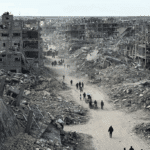On 10 July of this year, the International Criminal Court (ICC) sentenced Thomas Lubanga to 14 years in prison for conscripting child soldiers during the conflict in the Democratic Republic of the Congo. This is the first sentence to be handed down by the permanent court, which was established in 2002. Although this was the decision that the victims were expecting, and one that marks an important milestone in the fight against the impunity of international crime, it may nevertheless leave an empty feeling. Aside from the punishment, the victims are still waiting for reparation. This recent decision is a good opportunity to take a look at an ever-developing justice system.
In the last 10 years, the ICC has managed to establish itself as a vital tool in the fight against impunity. It is the first permanent criminal court with the power to rule on crimes against humanity, war crimes and genocide, taking over from the various criminal courts that were established following some of the bloodiest conflicts of the twentieth century, notably the Second World War and wars in the former Yugoslavia, Rwanda and Cambodia. The precedents put in place by these ad hoc courts provide solid foundations on which to build an international criminal justice system. In a limited time frame these courts – almost – all lived up to their promises. The International Criminal Tribunal for the former Yugoslavia, for example, deserves credit for arresting all of those who committed international crimes.
The ICC is more than just another brick in the wall – it is an innovator. For the first time, the voices of the victims can be heard in an international criminal court. Furthermore, the victims are not just treated as a piece of evidence, but as genuine participants, with the procedure being carried out in their interests. This example has inspired courts created since, such as the Special Tribunal for Lebanon established in 2009. Moreover, the ICC is recognised by the United Nations and can therefore be called upon by the UN Security Council, as it was in 2010 following human rights violations in Libya. Similarly, situations such as those occurring in Syria could in future be brought before the court.

On 15 June of this year, Fatou Bensouda from Gambia became the new prosecutor of the ICC. With her considerable experience in fighting against international impunity, Ms Bensouda is the first woman from Africa to take this post. Beyond this symbolic aspect, it was her experience within the ICC and with the International Criminal Tribunal for Rwanda that led to her appointment. Some may even say that she has become one of the most powerful women in the world.
In spite of these encouraging steps forward, the ICC still has a number of challenges to overcome. Firstly, there needs to be international recognition for the ICC and its founding treaty, the Rome Statute. Only 121 of the UN’s 193 member states are signatories to the Rome Statute. Countries such as the United States, China, Russia, India, Israel, Iran and Cuba still do not recognise the court.
Another major hurdle is that the court’s funding depends on contributions from member states. Consequently the ICC is currently short on funds, which has slowed progress in victims’ rights. Of course, there is a cost associated with allowing victims to participate and providing reparations for them, but budget cuts must never jeopardise the principle of allowing victims to participate, as set out in the Rome Statute.
Lastly, without its own police force, the ICC depends on the goodwill and cooperation of states, particularly in arresting the accused. As an example, in July 2011 the African Union called for its members not to cooperate with the ICC. As a result, Sudanese President Omar El Beshir, who is accused of crimes against humanity, is able to travel freely between countries that have heeded this call.
It is important to celebrate International Criminal Justice Day in order to continue the fight against impunity and send a message to those who commit international crimes. From now on, they will answer for their crimes and their victims will be able to seek reparations. Let’s hope that the next decade will see these principles take root and grow stronger still.
>> « Plus jamais ça ! » – testimonies by victims of international crimes (DR Congo) © ASF (pdf in French)



